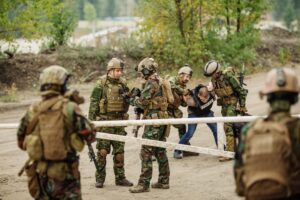§ 892. Art. 92. Failure to Obey Order or Regulation
In military law, adherence to orders and regulations isn’t just about maintaining discipline; it’s a cornerstone of operational integrity and unit cohesion.
Article 92 of the Uniform Code of Military Justice (UCMJ) addresses one of the critical aspects of military law – the failure to obey an order or regulation. Below, a court martial lawyer explores what Article 92 entails, its implications, and how it upholds the values and effectiveness of the military.
What is Article 92?
Article 92 falls under the UCMJ, the foundation of military law in the United States. It specifically deals with the failure of service members to obey orders or regulations.
Under Article 92, there are three offenses:
- Violating or failing to obey a lawful general order or regulation.
- Violating or failing to obey other lawful orders.
- Dereliction of duty.
Violating or Failing to Obey Lawful General Order or Regulation
In the structured environment of the military, orders and regulations are the backbone that ensures discipline, efficiency, and the successful completion of missions.
Among these, a lawful general order or regulation holds a special significance. These directives apply universally to all armed forces members or specifically to those within a particular branch, setting standards and procedures that are critical for maintaining order and discipline. Understanding the nature and implications of violating or failing to obey such orders is essential for every service member.
Nature of Lawful General Orders or Regulations

Lawful general orders or regulations are comprehensive directives issued by a military authority. They are not suggestions; they are mandatory instructions that govern service members’ conduct, performance, and responsibilities. These can range from operational protocols, safety procedures, and conduct standards to administrative processes. The key aspect that defines these orders or regulations is their general applicability across the entire armed forces or within specific branches, units, or commands.
Examples of general orders or regulations include:
- Operational Security (OPSEC) Protocols: Regulations that protect sensitive information from being disclosed, ensuring the security of military operations.
- Dress and Appearance Standards: Directives outlining uniform standards and personal appearance, maintaining professionalism and discipline.
- Safety Procedures: Comprehensive guidelines to ensure the safety of personnel during training, operations, and day-to-day activities.
- Conduct Standards: Regulations defining acceptable behavior, both in and out of service, to uphold the integrity and honor of the military service.
Implications of Violations
Violating or failing to obey lawful general orders or regulations undermines the foundation of military discipline and operational effectiveness. Such violations can lead to a breakdown in unit cohesion, compromise mission success, and endanger the lives and safety of service members.
The consequences of such actions are therefore taken very seriously and can include:
- Disciplinary Action: Ranging from non-judicial punishment to court-martial, depending on the severity of the offense.
- Administrative Actions: Such as letters of reprimand, demotion, or involuntary separation from service.
- Impact on Career: Affecting promotions, assignments, and eligibility for certain benefits or honors.
The Importance of Compliance
Compliance with lawful general orders or regulations is not merely about avoiding disciplinary action; it’s about contributing to the collective mission and welfare of the military community.
Adhering to these directives ensures operational security, maintains standards of professionalism, and fosters an environment of trust and respect among service members. It reinforces the commitment to duty and the values of the military, ensuring each member faces service challenges with honor and integrity.
Violating or Failing to Obey Other Lawful Orders

In the military, orders are the lifeblood of operational discipline and cohesion.
Beyond the broad directives known as general orders or regulations, a category of directives specifically tailored to individuals or units is known as “other lawful orders.” These orders maintain the precision and responsiveness of military operations.
Understanding the significance of these orders and the implications of failing to comply is essential for every service member.
Nature of Other Lawful Orders
A superior officer issues other lawful orders, which are not necessarily part of general orders or regulations but are nonetheless mandatory. These orders can be operational, administrative, or even related to conduct, and they are often specific to the circumstances, mission requirements, or particular duties of an individual or unit.
The chain of command holds the authority to issue such orders, ensuring efficient and effective military operations and activities conducted.
Examples of other lawful orders include:
- Operational Orders: Specific instructions related to the execution of a mission, such as patrol routes, guard duties, or engagement protocols.
- Administrative Orders: Directives related to the administration of a unit or the performance of official duties, including reporting times, submission of documents, or attendance at briefings.
- Conduct-Related Orders: Instructions related to behavior or conduct, such as refraining from contact with certain individuals or avoiding specific locations.
Implications of Violations
Failing to follow other lawful orders can have significant consequences for military discipline and the successful completion of missions. Such violations disrupt the chain of command, undermine authority, and can lead to operational failures, endangering the lives of service members and the overall mission.
The military justice system treats these violations with seriousness, and the consequences can vary widely based on the nature of the order and the context of the violation:
- Disciplinary Actions: These may include non-judicial punishment under Article 15 of the UCMJ, court-martial proceedings, or other disciplinary measures, depending on the severity of the offense.
- Administrative Consequences: These can involve demotions, reassignments, or other administrative penalties that can have long-lasting effects on a service member’s career.
- Impact on Unit Cohesion and Morale: Violations can erode trust within a unit, lowering morale and affecting the unit’s ability to function cohesively.
Dereliction of Duty Under Article 92

Dereliction of duty is a serious offense in the military, encompassing situations where a service member willfully or through neglect fails to perform assigned duties. Article 92 of the UCMJ addresses the failure to fulfill obligations through direct disobedience and inattention or disregard for duty.
Nature of Dereliction of Duty
Dereliction of duty involves a service member’s failure to perform their duties properly. This can occur through various actions or inactions, including negligence, laziness, or intentional disregard for responsibility.
The key elements that characterize dereliction of duty include:
- Willful Neglect: Intentionally failing to perform one’s duties.
- Negligent Performance: Failing to perform one’s duties due to carelessness or lack of effort.
The distinction between willful and negligent acts is significant in determining the severity of the offense and the consequent disciplinary actions.
Examples of dereliction of duty include:
- Failure to Secure Weaponry: Not properly securing or accounting for weapons, potentially endangering others or compromising security.
- Neglecting Guard Duty: Falling asleep or inattentive while on guard duty, failing to provide necessary security.
- Mismanagement of Sensitive Information: Carelessly handling classified or sensitive information, leading to its unauthorized disclosure or loss.
- Lack of Maintenance: Failing to maintain equipment or vehicles, resulting in their disrepair or malfunction during critical operations.
Legal Implications and Consequences
The consequences of dereliction of duty under Article 92 can be severe, reflecting the seriousness of the military views on the obligation of service members to perform their duties diligently.
Depending on the circumstances, consequences can include:
- Non-Judicial Punishment (NJP): Commanders may impose punishment without a court-martial for less severe instances.
- Court-Martial: For serious offenses, service members may be tried in a military court, facing penalties such as confinement, forfeiture of pay, demotion, or even dishonorable discharge.
- Administrative Actions: Instead of legal actions or in addition to them, administrative measures, such as reassignment, loss of clearance, or mandatory retraining, may be applied.
Implications of Article 92
The implications of failing to comply with Article 92 can be severe and wide-ranging. They emphasize the importance of discipline and order within the military framework. Penalties for violations can include demotion, forfeiture of pay, confinement, or even a dishonorable discharge, depending on the severity of the offense.
It’s not just about the punishment, however. Enforcing Article 92 ensures safe and effective operations while maintaining and respecting the chain of command. This affects not only the individual service member but also the operational readiness and effectiveness of their unit and the military.
When Do I Need a Lawyer for Charges Under Article 92: Failure to Obey Order or Regulation?

Facing charges under Article 92 of the UCMJ for failure to obey an order or regulation is a significant event with potentially severe consequences for a service member’s career and future. Legal representation becomes necessary in such instances, providing guidance, strategy, and advocacy necessary to navigate military law effectively.
Legal representation is important for several reasons, and understanding when to seek a military lawyer can help protect your rights and interests throughout the legal process. A skilled military defense lawyer assesses your case, offering strategic guidance tailored to the unique challenges of military justice. Don’t underestimate the significance of legal representation; it is your safeguard against potential pitfalls and a proactive step towards a fair and just resolution.
- Understanding Your Rights and Charges: A military lawyer can clarify the charges against you, the legal proceedings to come, and your rights under the UCMJ. They’ll outline possible consequences and the best strategies for your defense.
- Navigating the Military Justice System: The unique procedures and rules of the military justice system require a knowledgeable military defense lawyer to handle your case correctly.
- Developing a Defense Strategy: A military lawyer will evaluate the evidence against you, identify the prosecution’s case weaknesses, and create a tailored defense strategy. This can include challenging the order’s lawfulness, proving the failure to obey wasn’t willful, or presenting mitigating circumstances.
- Representation at Trial: Having an experienced military defense lawyer is beneficial in trial situations. They will defend you, question witnesses, present evidence, and argue on your behalf before the military court.
- Advising on Plea Agreements: Sometimes, negotiating a plea deal is in your best interest. A military defense lawyer can guide you on this option and negotiate favorable terms on your behalf.
- Mitigating Consequences: Should a conviction seem inevitable, a military defense lawyer can still help by arguing for reduced penalties and drawing attention to your service record, personal circumstances, and mitigating factors.
When to Seek Legal Advice
Know the right time to seek legal counsel:
- As Soon as You’re Aware: Contact a military defense lawyer immediately upon learning you’re under investigation or facing charges. Early legal intervention can significantly impact the case outcome.
- Before Making Statements: Consult with a military defense lawyer before discussing the charges with investigators or superiors to avoid self-incrimination.
- During the Investigation: Receiving legal advice during the investigation ensures fairness in the process and upholds your rights.
Charges under Article 92 are serious and can significantly impact your military career and personal life. Early and effective legal representation can protect your rights, career, and future. A competent military defense lawyer will guide you through the legal intricacies, advocate on your behalf, and strive for the best possible case outcome.
Contact a Military Lawyer for Article 92 Charges

Jeremy Snyder, Military Defense Lawyer
If you’re facing charges under Article 92 for failure to obey an order or regulation, you need to understand the gravity of the situation. Military law is intricate, and going through the process without professional legal assistance can negatively affect the outcome of your case.
Speaking with a military lawyer early in the process is key. A military defense lawyer will allow you to understand the charges you’re facing and discuss the possible implications for your career and life. This initial consultation is an opportunity to ask questions, explore your legal options, and decide on the best course of action given your circumstances.
Facing Article 92 charges can be intimidating, but you don’t have to go through the process alone. Contacting a military defense lawyer today can be the first step toward confidently handling these challenges. With a lawyer’s support, you can work towards a resolution to protect your career and uphold your rights.
Receiving legal advice during the investigation ensures fairness in the process and upholds your rights. Reach out to a military defense lawyer now to ensure you have a strong advocate by your side every step of the way. Call us at 800-235-3645 or fill out our online contact form to reach out to our legal team.